|
|
WRI study says there are major opportunities to slow climate change through forest, biodiversity and land-use initiatives
The Washington DC-based World Resources Institute (http://www.wri.org/wri) and the World Conservation Union (IUCN, http://www.iucn.org) launched a report, Climate, Biodiversity, and Forests: Issues and Opportunities Emerging from the Kyoto Protocol..
The report examines why, with so much at stake, the role of forests and land-use change under the Kyoto Protocol remains controversial, and attempts to clarify the issues. The report notes that climate change itself is a major threat to biodiversity, causing species loss and ecosystems destruction, and explains that protecting biological diversity may, in fact, help mitigate other impacts of climate change. The report stresses that while energy-sector emissions are the predominant contributor of the climate change problem globally, forest conversion and other land-use practices are also significant, contributing some 30 percent of the atmospheric buildup of carbon dioxide.
The report is launched as climate change and biodiversity NGOs attempt to develop a common approach to LUCF issues within the context of the Protocol negotiations.
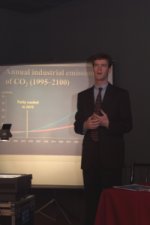 Left: Duncan Austin, WRI (e-mail: duncan@wri.org)
Left: Duncan Austin, WRI (e-mail: duncan@wri.org)
Duncan Austin, World Resources Institute Economics and Population Program and Paige Brown, talk to
Peter Doran about the issues addressed in the report and the debate going on between environmental NGOs.
Right: Jonathan Lash, President, World Resources Institute, during a WRI press conference
Flexibility and private sector partnerships: meeting the challenge of climate change in the developing world The US Business Council for Sustainable Energy (BCSE) and the European Business Council for a Sustainable Energy Future (e5) hosted a discussion on incentives for investment in developing countries that reduce greenhouse gas emissions and foster economic development. The meeting included speakers from Enron Corporation, the United States Agency for International Development and ESKOM South Africa.
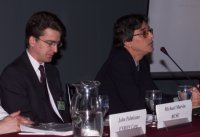 Michael Marvin, US Business Council for
Sustainable Energy, and Emilio La Rovere, Universidade Federal de Rio de Janeiro,
during a panel discussion on the "Clean Development Mechanism: Accelerating
Technology Transfer in the Developing World"
Michael Marvin, US Business Council for
Sustainable Energy, and Emilio La Rovere, Universidade Federal de Rio de Janeiro,
during a panel discussion on the "Clean Development Mechanism: Accelerating
Technology Transfer in the Developing World"
Paul Metz from the European Business Council for a Sustainable Energy Future discusses key issues in this real audio interview.
Results of the UNFCCC workshop on emission factors and activity data The UNFCCC Secretariat hosted a forum on the Emission Factors and Activity Data of Greenhouse Gas Inventories of non-Annex I Parties. The Secretariat presented the results from a workshop in Havana, Cuba. The first in a series, the aim of the workshop was to assist non-Annex I parties in the development of emission factors and activity data for estimating the greenhouse gas inventory.
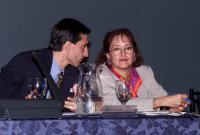 Omar Masera,
Instituto de Ecologia, UNAM, Mexico, consults with Martha Perdomo of the UNFCCC
Secretariat
Omar Masera,
Instituto de Ecologia, UNAM, Mexico, consults with Martha Perdomo of the UNFCCC
Secretariat
Martha Perdomo of the UNFCCC discusses the problems facing developing countries in terms of creating inventories
Climate Change and the Science-Policy Interface Participants in a briefing organized by the University of California Institute on Global Conflict and Cooperation (IGCC, http://www-igcc.ucsd.edu) were: - Lisa Shaffer of the University of California, Scripps Institution of Oceanography
- Stephen Schneider, Stanford University
- Richard Somerville, University of California, Scripps Institution of Oceanography
- Mark Thiemens, UC, San Diego Center for Environmental Research and Training RealAudio selections from the briefing:
Moderator Dr Robert Shelton opens the meeting and Lisa Shaffer talks about global observing strategies, arguing that good science requires good data.
Stephen Schneider discusses environmental literacy and the public debate on global warming
Press Briefing: Wind energy plan unveiled
A new report from the European Wind Energy Association (EWEA), Forum for Energy and Development and Greenpeace International has been launched at COP-4. The report's title is Ten Percent of the World's Electricity Consumption from Wind Energy - Is that target achievable?
Written by Birger Madsen of BTM Consult Aps, the report suggests that 10% of the world's electricity consumption could come from wind energy by 2016-17, the equivalent of the consumption of approximately 500 million European households. It also suggests that wind energy could contribute a 2.53GTon/year annual saving of carbon dioxide by 2025. This scenario assumes firm international commitments and agreements to promote the penetration of wind energy.
Panelists included:
- Christopher Bourillon (Chief Executive, EWEA)
- Hans Bjerregaard (Chairman, Forum for Energy and Development)
- Corin Millais (Head of Renewables Campaign, Greenpeace International)
- Holger Ronitz (Greenpeace Press Office)
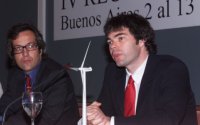 Holgar Ronite, Greenpeace
International press officer, and Corin Millais, head of the Greenpeace International
Renewables Campaign, at a joint press conference with the European Wind Energy
Association and the Forum for Energy
Holgar Ronite, Greenpeace
International press officer, and Corin Millais, head of the Greenpeace International
Renewables Campaign, at a joint press conference with the European Wind Energy
Association and the Forum for Energy
Press Briefings: Climate Action Network
The briefing was held by Climate Action Network (CAN), an organisation representing more than 200 environmental groups worldwide. Its aim was to summarize their views on progress at the end of the first week of COP4 negotiations.
Speakers included Kirsty Hamilton (Greenpeace), Ute Collier (WWF), Patrick Green (Friends of the Earth) and Surya Mulandar (CAN South East Asia). They raised concerns that the first week of negotiations had not resulted in clear progress on key issues.
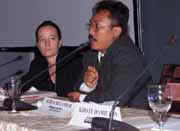 Surya Milandar, CAN Southeast Asia, at
the Climate Action Network press conference
Surya Milandar, CAN Southeast Asia, at
the Climate Action Network press conference
In this real audio interview, Kirsty Hamilton (Greenpeace) outlines the outcomes she would like to see from COP4.
Miscellaneous photos
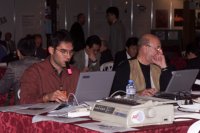 Journalists frantically try to meet their deadlines in the press area Journalists frantically try to meet their deadlines in the press area |
 Hisanaga Kawamura, Ministry of International Trade and Industry, Japan,
tries to mop some of the water out of the Japanese delegation's office after water leaked
through the roof of the conference center during a rainy day. (Is this what they meant by
COP MOP?) Hisanaga Kawamura, Ministry of International Trade and Industry, Japan,
tries to mop some of the water out of the Japanese delegation's office after water leaked
through the roof of the conference center during a rainy day. (Is this what they meant by
COP MOP?) |
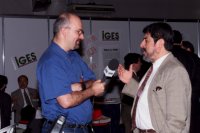 A BBC reporter interviews Eduardo
Sanhueza, Chile A BBC reporter interviews Eduardo
Sanhueza, Chile |
 Ambassador Tuiloma Neroni Slade, Samoa, and Farhana Yamin, Director,
Foundation for International Environmental Law and Development (FIELD) dicuss strategy
over coffee Ambassador Tuiloma Neroni Slade, Samoa, and Farhana Yamin, Director,
Foundation for International Environmental Law and Development (FIELD) dicuss strategy
over coffee |
|
|
|
 Azza Taalab signs copies of her book "Rising Voices against Global
Warming" at a reception for the release of a Spanish version
Azza Taalab signs copies of her book "Rising Voices against Global
Warming" at a reception for the release of a Spanish version
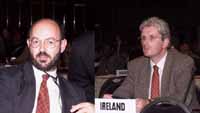 Irishmen Martin Diskin, Department of Public Enterprise, and Donal Enright,
Department of Environment and Local Government, were named "Most Gorgeous
Delegates" by Buenos Ayres (a daily conference paper produced in collaboration
with the Argentine Natural Resources and Sustainable Growth Secretariat and the
Fundación). According to Buenos Ayres, "during the SBI and SBSTA session they
turned all the ladies' heads."
Irishmen Martin Diskin, Department of Public Enterprise, and Donal Enright,
Department of Environment and Local Government, were named "Most Gorgeous
Delegates" by Buenos Ayres (a daily conference paper produced in collaboration
with the Argentine Natural Resources and Sustainable Growth Secretariat and the
Fundación). According to Buenos Ayres, "during the SBI and SBSTA session they
turned all the ladies' heads."11th Session of the Global
Diversity Forum (GBF, http://www.wri.org/wri/wri/biodiv/gbf/)
Buenos Aires, 6-8 November
The 11th session of the GBF will facilitate a dialogue between organizations involved in the UNFCCC and CBD processes. Organisers of the GBF session noted the threats to biodiversity caused by climate change.
At the opening plenary keynote speakers were:
Maria Julia Alsogarary, President of UNFCCC COP4, on Argentina and sustainable development
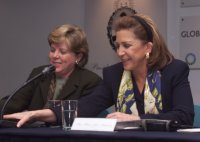 Left: Barcena and Alsogaray Left: Barcena and Alsogaray |
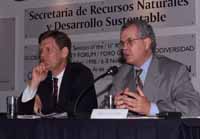 Right: Jonathan Lash and Cutajar Right: Jonathan Lash and Cutajar |
Return to ENB COP-4 home
© Earth Negotiations Bulletin, 1998. All rights reserved.


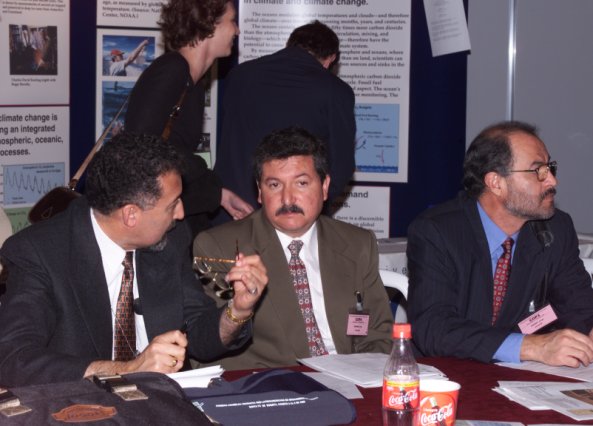
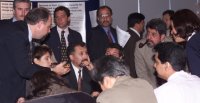
 Right:
Right: